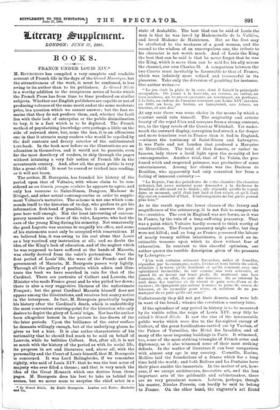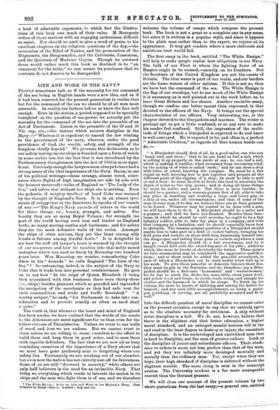BOOKS.
FRANCE UNDER LOUIS XIV.*
M. BOURGEOIS has compiled a very complete and readable account of French life in the days of the Grand Manarque, but the attractiveness of the work, it must be confessed, is less owing to its author than to its publishers. Le Grand Siecle is a worthy addition to the sumptuous series of books which the French Press has from time to time produced on similar subjects. Whether our English publishers are capable or not of producing volumes of the same merit and at the same moderate price, is a question which we cannot answer; but the fact re- mains that they do not produce them, and, whether the fault lies with their lack of enterprise or the public disinclination to buy, it is a fact which is to be deplored. The French method of popularising knowledge errs perhaps a little on the side of outward show, but, none the less, it is an efficacious one in that it attracts many readers who would be repelled by the dull contents and dreary exterior of the unillustrated text-book. In the book now before us the illustrations are an education in themselves, and it would not be possible, even for the most desultory of readers, to skip through the pages without attaining a very fair notion of French life in the seventeenth century. And, after all, the great public is very like a great child. It must be coaxed or tricked into reading, or it will not learn.
The author, M. Bourgeois, has founded his history of the period upon that of Voltaire, with whose claim to be con- sidered as an ternoin Presque oculaire he appears to agree, and only has recourse to Saint-Simon, Dangeau, Madame de &vigil& and other actual contemporaries in order to supple- ment Voltaire's narrative. The scheme is not one which com- mends itself to the historian of to-day, who prefers to get his information first-hand if possible, but it answers the pur- pose here well enough. Not the least interesting of contem- porary memoirs are those of the valet, Laporte, who had the care of the young King during his minority. Not unnaturally the good Laporte was anxious to magnify his office, and some of his statements must only be accepted with reservations. If we believed him, it was owing to his zeal alone that Louis as a boy received any instruction at all; and no doubt the idea of the King's lack of education, and of the neglect which he was supposed to have suffered at the hands of Mazarin, was chiefly derived from the valet's pretensions. Over the first period of Louis' life, the wars of the Fronde and the government of Mazarin, M. Bourgeois passes very lightly. Through all the gallery of portraits which adorn and illus- trate the book we have searched in vain for that of the Cardinal. There are portraits of Colbert and Lonvois, the Minister who made France great and he who pulled her down ; there is also a very suggestive likeness of the unfortunate Fouquet ; but the great Cardinal Mazarin himself does not appear among the illustrations, and receives but scanty notice in the letterpress. In fact, M. Bourgeois practically begins his history after the Cardinal's death, which is undoubtedly the most convenient starting-point for the historian who only desires to depict the glory of Louis' reign. Nor has the author been altogether honest in the picture he has drawn of the the later periods. Upon the brilliance of the outer surface he descants willingly enough, but of the underlying gloom he gives us but a hint. It is also rather characteristic of his nationality that he should find much to be said on behalf of Louvois, while he belittles Colbert. But, after all, it is not so much with the history of the period as with its social life, its progress in art and literature, and, above all, with the personality and the Court of Louis himself, that M. Bourgeois is concerned. It was Lord Bolingbroke, if we remember rightly, who said of Louis XIV. that he was the best actor of majesty who ever filled a throne; and that is very much the idea of the Great Monarch which one derives from these pages. M. Bourgeois does his best to take us behind the wanes, but we never seem to surprise the chief actor in a sad••Ls Grand Was. By Emile Bourgeois. London and Paris: Hachette 0o.
state of deshabille. The best that can be said of Louis the man is that he was loved by Mademoiselle de la, Valliere, and loved Madame de Maintenon. But as the first may be attributed to the weakness of a good woman, and the second to the wisdom of an unscrupulous one, the tribute to his character is not worth much. And of Louis the King the best that can be said is that he never forgot that he was the King, which is more than can be said for his ally across the channel, our own Charles II. A comparison between the two Courts must inevitably be favourable to that of France, which was infinitely more refined and resourceful in its pleasures. Take only the diversion of gambling for instance.
Our author writes :—
" Le jeu atilt la plaie de la cour, dont it faisait la principale occupation. On jouait la barrette, an reversi, au calbas, an trou-madame, au trente-et-quarante, au tourniquet, au portique, it la bete, au cadran de l'anneau tournant qua Louis XIV. invents en 1689, an hoca, au brelan, au lansquenet, aux echecs, au trictrac, et aux des."
At any rate there was some choice in the means by which a courtier could ruin himself. The originality and artistic beauty of the royal L'Aes and masques form a strong contrast, too, to the tipsy revels of the Court at Whitehall. Yet under- neath the outward display, corruption had struck a far deeper and more tenacious root in France than it had in England, —witness the testimony of Saint-Simon and Lo.bruyere. It was Paris and not London that produced a Marquise
de Brinvilliers. The trial of that famous, or rather in- famous, lady threw a lurid light upon the morality of her contemporaries. Another trial, that of La Voisin, the pro- fessed witch and suspected poisoner, was productive of some entertainment. Among her clients was the Duchess de Bouillon, who apparently had only consulted her from a feeling of innocent curiosity :— " La Reynie, run des presidents de catte chambre (la chambro ardente), fut assez malavise pour demander a la duchess° do Bouillon si elle avait vu le diable ; elle repondit qu'elle lo voyait dans ce moment, gull_ etait fort laid et fort vilain, of qu'il etait &guise en conseiller d'Etat. L'interrogatoire no fut guero pongee plus loin."
As to the result upon the lower classes of the luxury and magnificence of the aristocracy, it is not fair to compare the
two countries. The cost in England was not borne, as it was in France, by the ruin of a long-suffering peasantry. That was a point which Voltaire hardly seemed to think worthy of consideration. The French peasantry might suffer, but they were not killed; and as long as France possessed the labour of nearly twenty million inhabitants, it possessed an in- estimable treasure upon which to draw without fear of exhaustion. In contrast to this cheerful optimism, our author quotes the terrible description given of the peasants by La.brayere ;—
" L'on voit certains animaux farouches, males et femelles, repandus par la campagne, noire, livides et tout brfilas du soloil, attaches it in terre qu'ils fouillent et qu'ils remuent avoc 11/10 opiniatrete invincible; ils ont comma une voix articulee, et quand ils se levent our lours pieds, ils montrent une face humaine, et, en effet, ils sont des hommes. Ile se retirent la nuit dans des tanieres ott ils vivent de pain noir, d'eau at de racines ; ils dpargnent aux autres hommes in pains do eemer, de labourer, at do rocueillir pour vivre, at mdritent de ne pas manquer de ce pain qu'ils out sem6."
Unfortunately they did not get their deserts, and were left in want of the bread; whence the revolution a century later. If the splendour of any period in history is to be measured
by its visible relics, the reign of Louis XIV. may fitly be called le Grand Siecle. It saw the rise of the innumerable public works which were due to the far-sighted energy of
Colbert, of the great fortifications carried out by Vauban, of the Palace of Versailles, the Hotel des Invalides, and of many of the most imposing buildings in Paris. It witnessed,
too, some of the most striking triumphs of French arms and diplomacy, as it also witnessed some of their most striking defeats. In the matter of literature it can bear comparison with almost any age in any country. Corneille, Racine, Moliere laid the foundations of a drama which for a long time held the world; and both Boileau and La Fontaine have their place amidst the immortals. In the matter of art, how- ever, if we except architecture, decorative art, and the less important arts of the goldsmith and cabinetmaker, there are no very prominent names. Lebrun, perhaps, though his master, Nicolas Poussin, can hardly be said to belong to France, On the other hand, the engraver's art found a host of admirable exponents, to which fact the illustra- tions of this book owe much of their value. M. Bourgeois writes of these matters with an engaging enthusiasm difficult to resist. Nor should we omit to give a word of praise to his excellent chapters on the religious questions of the day, the revocation of the Edict of Nantes, and the persecution of the Huguenots, the Dragonnades, and the Calvinists, Jansenism, and the Quietism of Madame Guyon. Though its outward dress would rather mark this book as destined to be " an ornament for the table," we can assure its purchaser that its contents do not deserve to be disregarded.

















































 Previous page
Previous page